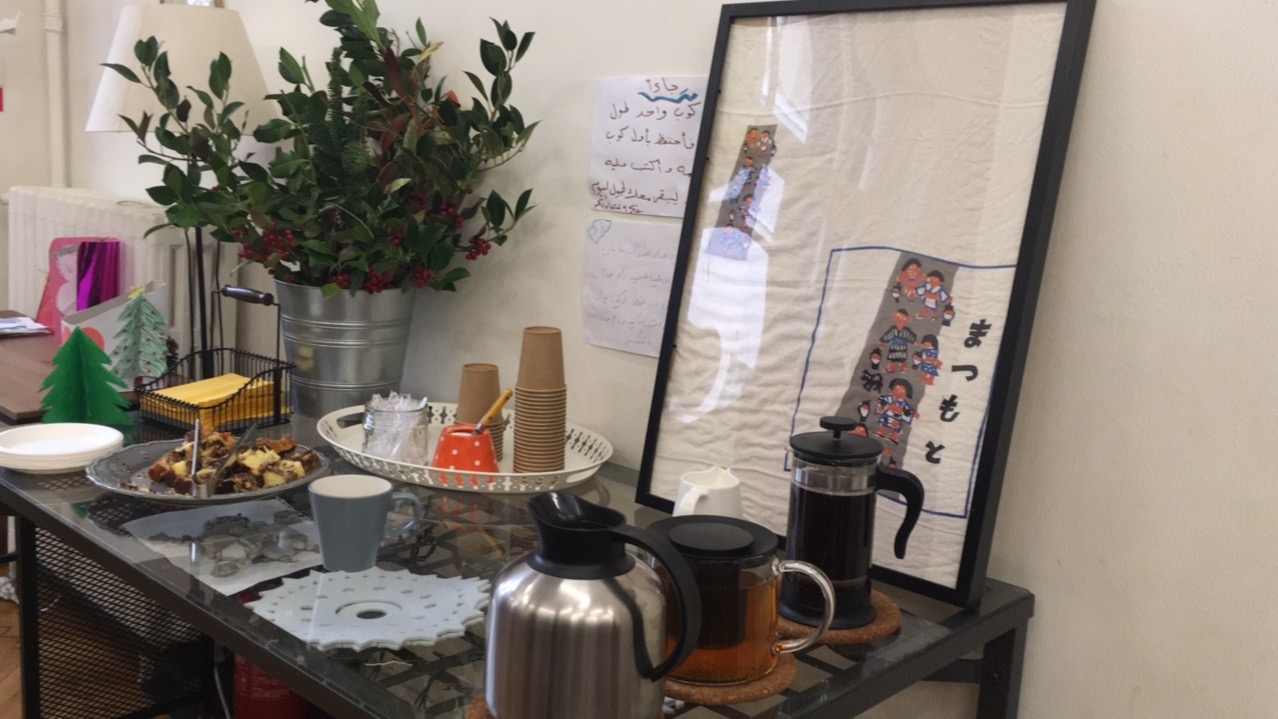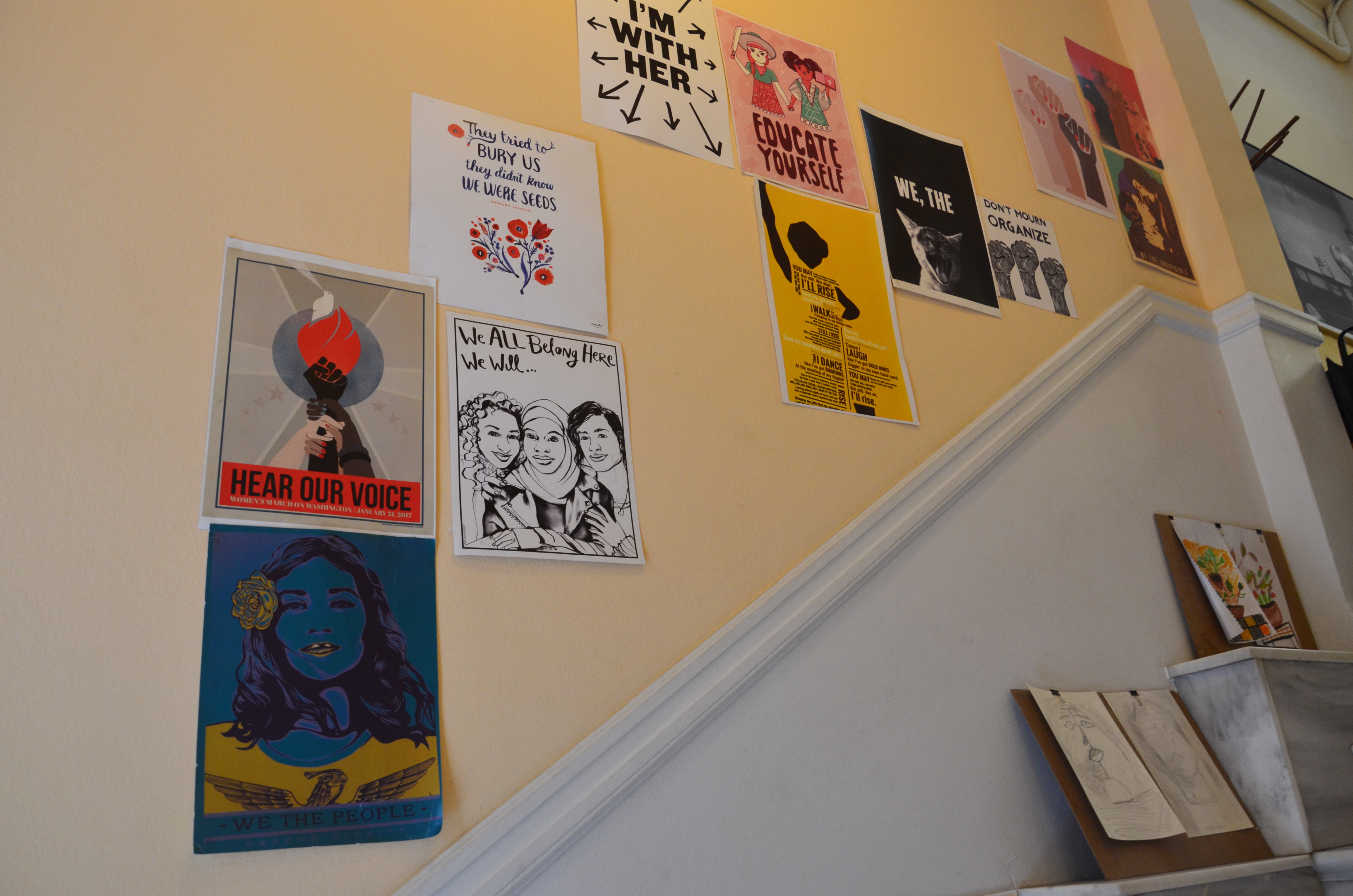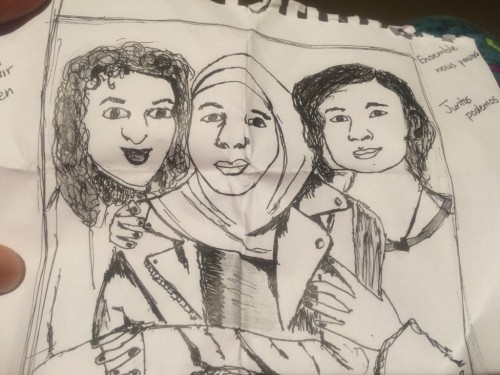“We all come from different backgrounds to tell our stories and share food. And that, of course, horizontally expands us day after day. I mean, makes us fat,” jokes co-founder of the organization Nadina Christopoulo while offering us home baked cake.

Why This Organisation Is Important
Accordingly to Nadina, with over 120 women attending every class and 40-45 women that keep up with the specific workshops only, Melissa Network is now the number one community center in Athens that is devoted to refugee assistance in building their future.
1. Melissa Network was the first organisation that in March 2016 has adopted the concept of thinking about people with “legal limbo” status as of potential neighbours of Greeks.
2. Activities and support that can are found by many in the centre are based on the experience of leader women that themselves once have migrated to Athens. The explanation of this choice lies on the surface. “Who knew better how to provide the support to people that arrived at another country than the migrants from Melissa Network that already had a migration experience?” voices Nadina.
Running The Centre
Step #1: The group of initiatives reached out to local communities and invited people to a full day of different consultations. It is interesting that Melissa Network workers expected 10-12 people to show up, instead, it turned out that nearly 104 women were interested in the project. As soon as activists realised that the idea succeeded, they deiced to run the centre.
Step #2: They applied for the special funding and activated the community centre in July 2015, which is a pick point of the refugee crisis in Greece.
Meaning Behind The Name
Melissa Network is an organisation which initial and centre role is in connecting and straightening the voice of women that come from various backgrounds and currently live in Athens, Greece.
“The idea in mind was to create a platform where women of different origins will connect with one another, will try to find solutions to problems, share their skills, learn from each other and in a way find their own voice,” declares Nadina.
One may wonder what the name of the organisation, which is Melissa Network, may stand for. Luckily, there is the story behind it. As Nadina tells us, “melissa” is a Greek word that stands for “honey bee“. This name of the community was chosen carefully to serve a reminder of the positive message that Melissa Network tries to convey.
Indeed, this initiative brings activist women from all over the world that work in the company to bring their skills and talents in order to help refugees build their future.
Most of the members of the community are refugees. The fact that the organisation itself was created three years ago, which means it was activated before the refugee crisis in Athens, makes the story of Melissa Network’s progress even more intriguing.
Activities
All the companies were based on the memories of the necessities that community activists lacked when they first moved to Greece
1. Home made food is usually cooked by the members of the organisation as it restores the concept of home and creates a warm atmosphere within the centre.
2. The community holds many different workshops. For example, in one of them women were making hand-made toys for refugee kids to present them something that was made individual for each of the children.
3. “Care packs” were provided for refugee mothers.
4. There are various classes in which everyone is welcome to enroll. Courses are divided into thematic units. For instance, some of them deal with literacy issues, language barrier, lack of law knowledge, social support, art and creativity, network and skills buildings, the sets of information sessions about health are also provided. In language classes, “students” are mixed so that the atmosphere encourages people from different backgrounds to communicate.
How It All Have Started
In the beginning of the 20th century the area in which Melissa Network is now located was a prestigious part of the city centre. However, as years passed by social and economic climate have massively been changed. In the result in the last decade a lot of property owners abandoned their apartments, for they have moved to more expensive housing. Meanwhile, this area gradually was occupied by Greek fascist political party Golden Dawn. As Nadina recalls it, fascists from Golden Dawn terrorised people by established totalitarian control of the whole neighbourhood. At the same time, the refugee crises came and these sudden events have only straightened people’s fear of this area.
Back in July 2015 the main destination for many refugees in Athens was Victoria Square, which is one block away from Melissa Network’s location. That means the oranistatcion was located in the very centre of these globally important phenomenon. In that context the community activists was not able to ignore the fact that there were hundreds of people that left their homes and escaped from the war zone now were sleeping in the streets because of no support was provided by the government at that point. The establishment of stability in the neighbourhood was not seen by the initiative as a mission but it turned out that the community has very much contributed to recreating peace in the neighbourhood.
It happened naturally even thought no Melissa Network activist would have expected that the initiative can make a positive impact on the poisoned environment that surrounded them back then. The trick is, Nadina laughs, that in the very beginning of Melissa Network the initiative members had no other option but to rely on people’s donations so they encouraged community members to pay local shops and bakeries in advance so that when food is needed organisation workers can easily get it. This necessity surprisingly allowed to establish trust amongst the enterprisers and the company. “They all experience something positive which have started on the base trust.” All over the sudden this poisoned with fascism area became a place where humans support each other.
Structure of Our Visit
Throughout our visit, we had different encounters with many incredible, inspiring women. Some of them were introduced by Nadina during the lecture. As a means of comprehending the Melissa Network’s experience, we decided to divide our engagement with the place in four categories: the lecture given by the director of the center, the short talk given by a drama therapist, the dance steps performed by the girls, and the walls’ decorations. Besides these categories, the cake made by the Nigerian woman was also an important part of our visit. We will expand on each of these aspects of our trip.
The lecture given by the director of the center gave us a better sense of the origin and purpose of the center. The video of the lecture can be found below.
Melissa Network Lecture 1 – Melissa Network Lecture 2 – Melissa Network Lecture 3 – Melissa Network Lecture 4 – Melissa Network Lecture 5 – Melissa Network Lecture 6 – Melissa Network Lecture 7 – Melissa Network Lecture 8 – Melissa Network Lecture 9
Most of the information provided in the lecture was synthesized in sections above in order to provide an overview of what Melissa Network is and what it entails. However, there were other aspects of our interactions at Melissa Network that are worth writing about as well. In the following sections, such aspects will be summarized.
Short Talk about Drama Therapy
During our visit to Melissa Network, we had a very interesting encounter with a drama therapist, who explained to us a little bit about what drama therapy is, and how it works. By doing so, she really showed how drama can be used as a vehicle for allowing people who were affected by different forms of trauma to partially ‘heal;’ perhaps finding ways of dealing with their trauma. Videos of the talk delivered by the drama therapist can be found below.
Drama Therapy Talk 1 – Drama Therapy Talk 2 – Drama Therapy Talk 3 – Drama Therapy Talk 4
Girls’ Performance
The girls at Melissa Network seemed to be very confident and open, as they did not really hesitate to dance in front of the males of our group. This was quite interesting, especially considering that most girls came from countries which segregation between males and females are the norm. A possible reason that may explain why they seemed very comfortable is due to Melissa Network’s environment. It is likely that they perceive the environment as being a safe space where they will be respected in most occasions. I also think that Nadina is a very strong leader who shows that she is in control of everything, hence giving some sense of safety to the women at the center. It is hard to determine why exactly, but Nadina seems to be a very trustworthy person who is willing to fight for her ideals and for the women who visit the center.
Additionally, when the boys left, the girls immediately took of their hijabs and became even more free. The evening turned into an evening of sharing as they showed us a dance one of them had choreographed and we showed them a dance that we had created. They are extremely talented and fast learners and seem to be in an environment which fosters their friendship and ambitions. They took pictures with us (although on their phones) and recorded us doing the dance to practice. This was warming because it showed that no matter their situation they wanted to do the things they loved and practice their passions. We also exchanged contacts to allow us to stay in touch and perhaps meet again and share more experiences in the future.
Girls’ Dance 1 – Girls’ Dance 2 – Girls’ Dance 3
Wall Decorations
The decorations in the walls of the entrance of Melissa Network had very empowering messages for women, emphasizing the importance of education and women empowerment. At any center, the entrance tends to be one of the most important parts because it reveals what the rationale of the center is all about. Hence, I think that it becomes very clear at Melissa Network that the center is concerned about empowering migrant women in Athens, hopefully allowing them to develop their own projects, ideas and businesses.

The Cake
The cake baked by the Nigerian woman was one of the highlights of our visit as well. Concerning this tasty, delicious cake, Professor Debra Levine wrote a piece about it.
Arendt, Hannah. "We Refugees" Altogether Elsewhere: Writers o Exile. ed. Marc Robinson. 110-116. Boston: Faber and Faber, 1994.I had been reading all the students posts about the paradox of optimism in Hannah Arendt’s article “We Refugees.” The students were surprised that forced optimism led to depression and suicide among refugees, for Arendt says that the worst thing that can happen is that a refugee, who had a life, a reputation and social standing elsewhere, does not get the kind of recognition he or she had in her old life. No one wants to hear about the old life or the trauma the person has endured before they settle in a new place. A refugee becomes more acceptable if what he or she expresses is optimism for the future and represses the fullness of her past life. That condition, Arendt says, causes profound despair. But when I walked into the Melissa Network, I found a place that recognized, honored and even celebrated the past of the people who participate in its programs. What Melissa does is leverage skills and culture from one’s old life to create a future (through classes, microloans, business support, social integration) that honors the past. Rodrigo mentioned the delicious marble cake that was on the table around which we gathered, and there was more on a side table, along with pots of delicious coffee available to all who walked into the communal space. A woman from Nigeria, Maria Ohilebo, currently living in Athens, baked the cake in her home. We couldn’t get enough. No one remembered their manners. The cake was “amazing,” as our trip supervisor Pantelis would say, pronounced in his booming Cypriot accent. Maybe the the right kind of optimism was the secret ingredient. I don’t know. But the Nigerian baker was in the process of opening up her own bakery because the Melissa Network supported her in planning her business. Of course everyone is taught to adapt when they try and settle in a new place. But Melissa honors each and every refugee’s culture, history, and personal story. The memory of that cake helps me understand the right ingredients that make optimism – true optimism – possible.
Professor Debra Levine
